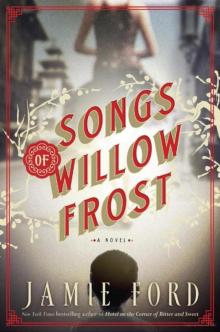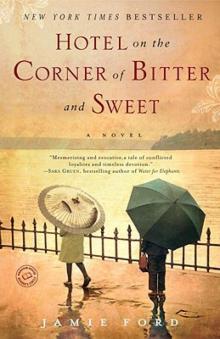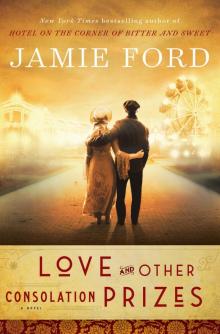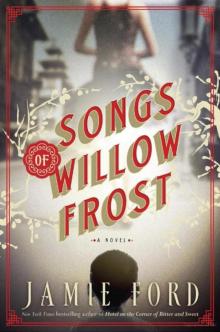- Home
- Jamie Ford
Love and Other Consolation Prizes Page 18
Love and Other Consolation Prizes Read online
Page 18
—
IN THE PARLOR, Mrs. Blackwell announced what the upstairs girls had hoped—that there would be no customers tonight, or tomorrow. The Tenderloin was officially on holiday through the weekend. Maisie whispered, “No one ever comes here on Christmas anyway. The desperate, brokenhearted codgers out tonight always hit up the cribs down the street.”
Miss Amber appeared in a silver wig and began to hold court.
She said, “Ladies, tonight is our Christmas. Tonight is a celebration of our family, together on this cold, snowy evening. And though I know some of you miss the homes and the places you once knew, we’re better off than so many others. And to remind us of that fact, and to honor Flora and all she’s done for us, we’re going to Georgetown to visit the King County Almshouse. We’ll sing carols and pass out gifts. Gloves and chocolate for all the moms, and stockings full of candy, peanuts, and oranges for the little ones.”
Professor True hoisted his gift bag.
“Then,” Mrs. Blackwell added, “we’ll return home for our own cup of good cheer.”
Ernest looked around, amused, as the upstairs girls clapped and the downstairs help worried about the weather. In a rush of excitement, everyone followed Miss Amber’s lead and donned coats and capes, caps and bonnets, mittens and scarves, and, last, their winter boots as they gathered in the foyer, preparing themselves to march fourteen blocks south through the falling, drifting snow.
“All but you, Ernest,” Miss Amber said as she grabbed him by the back of his collar. “I need someone to stay behind and tend to the fires.”
Crestfallen, Ernest nodded. He reluctantly removed his hat and coat.
“Ho-ho-home for the holiday,” Fahn teased.
“I’m sorry,” Maisie whispered, frowning.
“It’s okay,” Ernest said as he donned a pretend smile. “You’ll all be back home soon enough, I suppose. You’ll be frozen, but the fires will be roaring.”
Ernest stood outside the doorway, alone atop the stoop, as he watched everyone march away, singing “It Came upon a Midnight Clear.”
He closed the door and could still hear their voices in the distance. Professor True’s whiskey tenor rose above the choir of fallen angels as they sang and laughed and carried the spirit of celebration away with them. Dejected, Ernest trundled down to the basement to check on the boiler and make sure there was an ample supply of coal in the coal bin. Then he carried armloads of split firewood upstairs and restocked the hearths in the master suites. Finally, he sank into a plush chair in the parlor, stoking the main fire, but wondering what kind of merriment he was missing. As he watched bits of tar flare up and listened to the snapping and popping of still-green wood, he realized that the Tenderloin had never been this quiet.
He remembered something his mother had once said to him when he was a little boy. She’d said, “Everyone should spend one holiday alone. It’s good for the soul.” He wondered if this was just something a parent says when she has no presents to give, or if there was truth there. As he sat in the quiet of the parlor, he wasn’t sure how the emptiness he felt might make him a better person. Before he found an answer, he heard a rumble outside and the blaring of a car horn. He grabbed his coat and opened the door as a sleek, black Marmon roadster glided to the curb and a tall driver stepped out.
“I’m sorry, we’re closed for the evening.” Ernest glanced toward the back of the car. “The Tenderloin will be open again in a few days.”
“Well, I guess I’m at the right place then. Wasn’t sure if I’d be able to find it, what with all the snow,” the driver said. “Special delivery for Madam Florence.”
“Would you like to come in and get warm? And what exactly are you delivering?”
“Oh, my apologies, young fella, I thought it was rather obvious, I’m delivering…this.” The driver brushed the snow off the hood of the car with his coat sleeve and handed Ernest a strange-looking silver key. “That’s for the coil box below the steering wheel; the switch is inside. Ever start one of these things in winter?”
“I’ve never started one of these, ever.” Ernest spoke calmly but could barely contain his excitement. He clapped his hands together as though trying to keep warm.
“Well then, I guess you folks are going to have fun figuring out your new toy. The only other motorcar in the world that I know of that’s this nice was a Pierce-Arrow limousine delivered to the White House just last week, even though Taft’s a big horse-and-buggy guy.” The driver reached into his coat and handed an envelope to Ernest. The front was addressed to Madam Florence Nettleton, with the initials L.J.T. elegantly pressed into a waxy seal. “Have a merry Christmas, kid.”
Ernest stared at his Cheshire cat reflection in the wet chrome as the man walked away. The roadster sparkled like a starry night. It was the most beautiful machine he’d ever seen and certainly the most luxurious. Ernest wiped the falling snow off the polished chrome, then sat inside the motorcar and placed his hands atop the padded steering wheel. The pedals and levers were a mystery, one he looked forward to unraveling. But as his breath fogged up the windshield, Ernest grew cold and he went inside.
There he was startled to find Madam Flora, standing in the parlor in a flowing nightgown of pleated lavender. Her matching dressing jacket hung loosely, almost haphazardly, from her shoulders as she stared into the fire.
“I’m sorry,” Ernest apologized, “I thought you might have gone with the others. Would you like me to fetch you a blanket or a cup of tea?”
The matron of the house didn’t reply, didn’t blink, as the fire crackled and popped. Ernest began to worry that she was having one of her bad spells and wondered how he would handle her without help from the others. Miss Amber had been keeping her in her room, so the fits of madness had been confined to shouts in the night, blamed on nightmares.
“Do you have something for me?” she asked.
Ernest had forgotten about the envelope in his hand. “This came for you,” he said, “along with…”
“I saw. It’s a very nice automobile.”
He handed her the envelope. She regarded the embossing, and then pitched it into the fire without bothering to open it.
“Some people…” She sighed. “Some people think the world is for sale.”
Ernest looked on in disbelief as the paper lit up, was quickly engulfed in flame, and then crumbled to ash. He wanted to say something, but could only watch as Madam Flora slowly walked away from the hearth, from the warmth. Ascending the grand staircase, her figure disappeared into the darkness like a ghost.
Ernest sat down and waited for the others to return, thinking of the letters that had sealed the envelope, and the name: Louis J. Turnbull.
—
AN HOUR LATER the residents of the Tenderloin noisily tromped back inside, a mass of teasing and laughter. Miss Amber immediately went upstairs to check on Madam Flora, while the others kicked snow off their boots and warmed their rosy cheeks and frost-kissed noses in front of the fire. The Gibson girls doffed their coats, and the servants disappeared into the kitchen and returned with platters of sausage and cheese, bishop’s bread, black molasses cake, Christmas cookies, dried fruits, and shelled nuts of every kind. Mugs of cider and spiced wine appeared in everyone’s wet, cold hands. And Professor True shed his red Santa coat and began warming up his fingers on the piano. The suit’s oversize suspenders draped over his woolen button-down shirt as he removed his cuff links and rolled up his sleeves.
“Do we have a visitor?” Maisie asked Ernest. “I thought Amber made it perfectly clear that we were closed…”
“The automobile was delivered as a Christmas gift,” Ernest said, hesitating. “I was given a note…with the initials…L.J.T., but Madam Flora didn’t even bother to open the envelope. She just threw it in the fire.”
The Gibson girls overheard as they returned. “Louis Turnbull is back in our lives, ladies,” one of the girls said with a laugh. “Funny how the richest fella in town can’t seem to buy a hint.” They began
decorating the tree with dyed popcorn strings, gilded eggshells, and small, shaded candles. Though some churches banned Christmas trees, Miss Amber had bought the largest one they could find, a towering noble fir.
Maisie frowned at Ernest as her cold, pink cheeks grew pale.
“Is it really all that bad?” he asked. “Madam Flora had been talking about getting a car for months now.”
“It’s not the gift that’s the problem,” Fahn said as she handed him a mug of steaming cider with a cinnamon stick. She offered one to Maisie as well, but Maisie shook her head. “It’s what the giver wants in return.”
Ernest was about to ask more when Mrs. Blackwell changed the subject. “Ernest, I wish you could have been there at the almshouse. The children gushed over Santa, the women cried, the volunteers blessed us…and then Mrs. Irvine showed up mid-carol and told them where we all work.”
“You’re joking.” Ernest almost spit out his cider.
“Mrs. Irvine had her own group of merrymakers, and they looked at us as though Mary Magdalene had stumbled into the manger and kicked her knickers off. As if the Three Wise Men had showed up drunk with a girl on each donkey,” Mrs. Blackwell prattled on. “As if the Christ child were born the color of our St. Nick!” It was obvious that she’d already downed a quick glass or two of her famous syllabub made with cream and a potent raspberry wine. “So…after we finished singing, we were politely asked to leave—through the back door, no less. And Miss Amber and Mrs. Irvine certainly exchanged a few choice words…”
Fahn cut in, laughing. “Miss Amber called her a hypocrite to her face. She said Mrs. Irvine was a bitter old coot who goes to the doctor for pelvic massages—that she’d rather faradize than fraternize!”
“But”—Mrs. Blackwell rolled her eyes—“I didn’t want to cause a ruckus or ruin Christmas for the little ones. So I separated the two of them and we left. I was just happy they didn’t make anyone give back the gifts.”
“Of course,” Ernest said. He remembered his own bleak Christmases at the boarding school.
“Well, it was fun while it lasted,” Mrs. Blackwell said with a heavy sigh.
“No good deed goes unpunished,” Fahn added. “At least it’s a Christmas we’ll never forget. Should be an interesting new year.”
“Maisie May!” A few of the upstairs girls called out to her as they were almost done decorating the tall tree that smelled like Christmas. “It’s tradition, we need you to put the angel on top.” One of the girls held out a kiln-fired cherub painted with hints of sky blue and gold.
“I’m too old for that,” Maisie grumbled. “Besides, I don’t believe in angels anymore.” She turned and headed up the stairs.
Fahn nodded wearily as she handed her cup of warm cider to Ernest and followed Maisie, muttering something about rich devils.
After the party ended and the servants had cleaned up, Ernest lay awake in his bed, tossing and turning. Professor True had read everyone “The Night Before Christmas,” but as Ernest tried to sleep, he didn’t think about flying reindeer or sugarplum fairies. He thought about Maisie and how upset she’d been—Fahn too. Were they troubled by the scene at the almshouse, the mysterious gift from Louis Turnbull, or perhaps both? And Ernest wondered about Mr. Turnbull himself and what he might think if he caught a glimpse of his obsession in her current deranged state.
Ernest wasn’t sure what to do with his vague unease. Then he remembered the painted angels he’d wrapped as gifts.
With a worried sigh, he rolled out of bed and stepped to the window, scratching his head. There were no cars. No carriages. Even the saloons were closed. The entire city was asleep. The downy flakes had stopped falling, and all seemed solemn and still.
Ernest shivered at the thought of the cold and then got dressed. He bundled up in two pairs of pants and three shirts, and doubled his socks. Then he crept down the main staircase, which was carpeted and quieter. He tiptoed to the door, slipped on his boots, his overcoat, hat, and mittens. He wrapped a scarf around his face to keep his neck and cheeks warm.
Once outside, the air was so crisp, so cold it made his eyes water as he crunched through a thin eggshell crust of windborne powder, frozen atop the deep, wet snow. He walked around the building until he stood beneath Maisie’s darkened window. He looked across the wide street, which was now covered, with nary a footprint, then up at the window once again and watched his breath steam away into the night sky. Finally he sat down, lay back into that cold desert of fresh powder, spread out his arms, and made a snow angel. He stood up, regarded his work, then took a giant step toward Fahn’s side of the building, sat down, and did it all over again. He stepped again and again, up and down, occasionally feeling snow and ice go down his pants or the back of his shirt. He made snow angel after snow angel, covering the street, the sidewalk—anyplace that could be seen from the girls’ windows. He caught his breath as he counted three dozen, then four, then five, while his nose ran and his eyebrows froze.
Finally, he crept back inside, warmed himself in front of the fire, adding another piece of thick cordwood and watching it burn. Then he wearily climbed back into bed just before the grandfather clock downstairs sounded three in the morning.
Ernest was exhausted, but he smiled as he fell asleep, imagining the look on Maisie’s face at sunrise when she looked out her window, Fahn’s face too.
He wondered how many angels he’d made. He had no idea. He’d stopped counting after two hundred.
B SIDES
(1962)
Ernest stood on the sidewalk in front of Ruby Chow’s impatiently counting the minutes. He’d paid the bill and stepped outside while Juju and Gracie were still chatting with the waitresses—about nothing too revealing, Ernest hoped.
There had been an awkward silence after Gracie dropped her bomb about being a prostitute. Then Juju had deftly stepped in, saying something about having left too many copies of Whisper and Confidential magazines lying around the house for Gracie to read. Her mother must have misremembered a bit of Hollywood gossip about Veronica Lake or Helen Hayden. Since Gracie’s ailment had set in, she’d said plenty of things that didn’t make sense, and they’d laughed it off, albeit nervously. Meanwhile Gracie had turned her attention to a nice rock cod, roasted whole with shallots and fresh parsley. She’d put the tender cheek, the choicest part, on Hanny’s plate.
Everyone in Chinatown seems to have a B side to his or her character—an untold story—Ernest reasoned as he lit a cigarette and remembered that one of his favorite songs was a Hank Williams flip-side record, “I’m So Lonesome I Could Cry.” That song had seemed to do pretty well. Then again, some say Hank Williams died of a broken heart.
Poor Hanny, Ernest thought. She didn’t know what to believe. So she smiled and said nothing. I guess there’s comfort in denial.
But Rich knew the truth—Ernest could see that plainly in the man’s wide-eyed look of surprise and benign admiration, even as he went on and on about his colorful life in Las Vegas. He told a story about being a law clerk during the raid on Roxie’s, a famous western bordello. And about how he’d once met the famous Miss Bluebell, as well as Marli Renfro, the showgirl who’d been Janet Leigh’s body double in Psycho.
Fortunately for everyone, Hanny and Rich had had to leave before dessert. Rich had to take a phone call with a client who was in jail.
Ernest put out his cigarette and loosened his tie as he looked down the street toward Chinatown, past popcorn stands and Turkish baths, past businessmen in raincoats heading home or to a bar, and past secretaries running to the post office, or meeting their friends for a drink. He could see the old Washington Court Building in the distance—the ascendant home of Madam Lou Graham, then Florence Nettleton. The building was now home to the Union Gospel Mission, one of the few missions that had survived the great flu that wiped most of them out forty years ago. The building now had a neon sign, which read, REACHING OUT AND TOUCHING LIVES.
If there is a God, he’s the god of irony, Ernest thought.
The angels of Ernest’s childhood had been replaced by a scattered crowd of lonely, bearded men who wandered around the sidewalk entrance like pigeons bobbing for crumbs of bread and wobbling, noontime drunks, loaded to the muzzle.
Ernest was still gazing off into the distance when Juju emerged.
“It’s all true, isn’t it?” she said as she put a gentle hand on his shoulder. “What Mom said—and that’s where you both lived.”
Ernest nodded as his daughter handed him a bag full of pink take-out boxes. Gracie had appeared behind Juju, beneath an awning, buttoning her coat and covering her hair with a floral scarf as the cloudy sky began to drizzle.
“How’s she doing?” he asked.
“She’s restless,” Juju said. “She talked to everyone about the new world’s fair—says she’s dying to go. But she’s tired. She hasn’t been over to this part of town in forever—so many familiar faces, so much to process, so many…things remembered.”
“You’re taking this revelation about your mom remarkably well.”
Juju shrugged. “I deal with the lurid side of humanity for a living. Am I shocked? Of course, but she’s still my mother—who am I to judge? It was a long time ago, and back then only one in ten girls even graduated from high school. She’s probably lucky she ended up at the Tenderloin. Besides, I still have a deadline and a feature to write.”
Ernest cleared his throat.
“Oh, don’t get me wrong,” Juju said. “I’m leaving Mom out of it—I’m not crazy. But you—you’re still part of a great story. I still can’t quite believe you were raffled off and ended up in a brothel. That’s quite a secret.”
Ernest shook his head.
“I was just reading about how Louis Armstrong grew up in a bawdy house in New Orleans, a place just like the Tenderloin. That hasn’t hurt his record sales one bit.”
Ernest recalled a decades-old memory of Professor True talking about the urchin boys who grew up in Storyville and how they’d go through the suit coats of customers while the patrons were otherwise engaged, skimming the pocket change. Ernest’s life at the Tenderloin had been downright respectable by comparison.

 Songs of Willow Frost
Songs of Willow Frost Hotel on the Corner of Bitter and Sweet
Hotel on the Corner of Bitter and Sweet Love and Other Consolation Prizes
Love and Other Consolation Prizes Songs of Willow Frost: A Novel
Songs of Willow Frost: A Novel